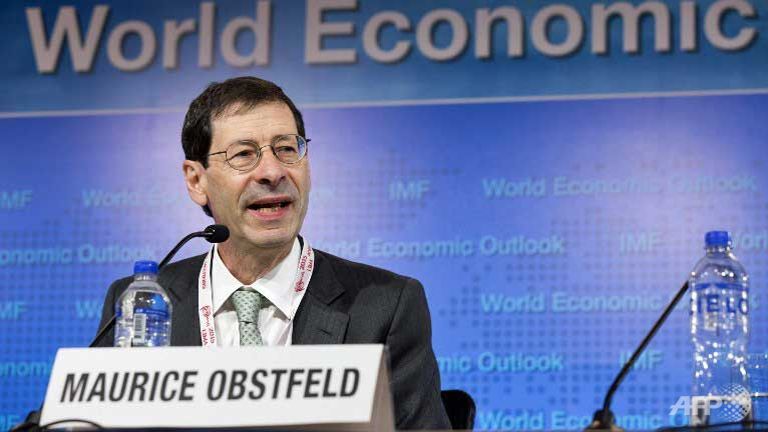New IMF economist sees major challenges to global economy
 |
| IMF new chief economist Maurice Obstfeld. (AFP Photo) |
WASHINGTON: Just a few months into the job, the challenges are already piled high for the International Monetary Fund's new chief economist Maurice Obstfeld.
There's the Federal Reserve's plan to raise interest rates - which poses a deep test to economies worldwide. There's Europe's migration crisis. And not to be forgotten is Britain's threat to leave the eurozone when the region's economy is already frail. That's all on top of slow global economic growth and climate change.
In an interview with AFP, Obstfeld, an economic advisor to US President Barack Obama before being named to the IMF, spoke of a "nightmare scenario" in which various pressures conspire to weaken the economic bonds of Europe.
"I worry a lot about the strong trend in Europe to pull back from market integration," he said. "One factor is the refugee crisis, where there's a lot of pressure on open borders and workers' mobility," he added. "There is a lot of political pressure coming from the extremes, which could undo a lot of the economic integration that has occurred."
Speaking in his IMF office just a few blocks from the White House, Obstfeld, 63, said other pressures were also stressing the 28-country EU bloc. "Another obvious one is Britain wanting to possibly leave the European Union," he said, raising the "Brexit" issue that is increasingly making headlines in Europe.
Obstfeld arrived at the Fund in September to replace French economist Olivier Blanchard, who held the chief economist job throughout the unprecedented financial crises in the United States and Europe.
Obstfeld, whose position entails advising the management and member countries of the global crisis lender on economic conditions, faces some different challenges from Blanchard, particularly the impact of the sharp slowdown in the world's second largest economy, China.
Climate change threat
An international economics specialist who studied at Cambridge and MIT and taught at Harvard and the University of California, Berkeley, Obstfeld has to keep watch on multiple hot issues and broader long-term trends.
"Climate change is a major economic threat. Warming reduces productive efficiency, climate disasters can be deeply disruptive to economic activity," he said. The Fund looks at how climate change will hit the economies and budgets of countries impacted the most, and tries to help them prepare.
With an upcoming global summit in Paris on action against warming, Obstfeld said countries need to understand it is a collective action problem. If it isn't solved, he said, warming "can threaten their population and impose macroeconomic risks."
The focus of the COP21 summit is obtaining pledges for carbon emissions. Obstfeld said limits can have adverse effects for some industries. But, for one, many industries essentially get a subsidy by being able to pollute without paying for it, he added. In addition, he said, implementing carbon dioxide limits "stimulates a lot of innovation and a lot of investment."
He said incentives need to be changed to favour emissions reduction, including essentially putting a tax on carbon. That "would be the most efficient way to reduce emissions at the lowest cost," he said. "Unfortunately, many countries, especially the United States, don't want to put in taxes. But that's really the efficient way to do it."
Federal Reserve risks
At the same time, Obstfeld has his eye on US plans to tighten monetary policy even while elsewhere, including Japan and the EU, central banks need to loosen theirs, he said.
He said the US Federal Reserve, expected to raise interest rates in December for the first time in nine years, might be better holding off a little longer.
The risks of the Fed acting sooner "are certainly higher," he said, adding: "I don't see huge risks at all to waiting." "If for any reasons the Fed had to reverse that first interest rate increase, markets would interpret it as a big deal."
As for the Fed's counterpart in the eurozone, he said the European Central Bank "should be following the strategy of expanding asset purchases and lowering the interest rate."
What the stars mean:
★ Poor ★ ★ Promising ★★★ Good ★★★★ Very good ★★★★★ Exceptional
Latest News
More News
- Russian President congratulates Vietnamese Party leader during phone talks (January 25, 2026 | 09:58)
- Worldwide congratulations underscore confidence in Vietnam’s 14th Party Congress (January 23, 2026 | 09:02)
- Political parties, organisations, int’l friends send congratulations to 14th National Party Congress (January 22, 2026 | 09:33)
- 14th National Party Congress: Japanese media highlight Vietnam’s growth targets (January 21, 2026 | 09:46)
- 14th National Party Congress: Driving force for Vietnam to continue renewal, innovation, breakthroughs (January 21, 2026 | 09:42)
- Vietnam remains spiritual support for progressive forces: Colombian party leader (January 21, 2026 | 08:00)
- Int'l media provides large coverage of 14th National Party Congress's first working day (January 20, 2026 | 09:09)
- Vietnamese firms win top honours at ASEAN Digital Awards (January 16, 2026 | 16:45)
- ASEAN Digital Ministers' Meeting opens in Hanoi (January 15, 2026 | 15:33)
- ASEAN economies move up the global chip value chain (December 09, 2025 | 13:32)
















 Mobile Version
Mobile Version